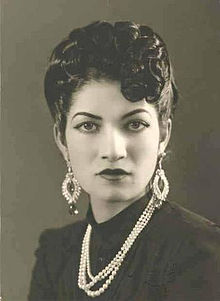Ashraf Pahlavi
| Princess Ashraf | |||||
|---|---|---|---|---|---|
| Princess of Iran / Persia | |||||
 |
|||||
| Born |
27 October 1919 Tehran, Persia |
||||
| Died | 7 January 2016 (aged 96) Monte Carlo, Monaco |
||||
| Burial | Monaco Cemetery | ||||
| Spouse |
|
||||
| Issue | Shahram Pahlavi-Nia Shahriar Shafiq Azadeh Shafiq |
||||
|
|||||
| House | Pahlavi | ||||
| Father | Rezā Shāh | ||||
| Mother | Tadj ol-Molouk | ||||
| Full name | |
|---|---|
| English: Ashraf ol-Molouk Persian: اشرف الملوک |
|
Styles of Princess Ashraf Pahlavi of Iran |
|
|---|---|
| Reference style | Her Imperial Highness |
| Spoken style | Your Imperial Highness |
| Alternative style | Ma'am |
Princess Ashraf ol-Molouk Pahlavi (Persian: اشرف الملوک پهلوی Aŝraf Pahlavi; 27 October 1919 – 7 January 2016) was the twin sister of Mohammad Reza Pahlavi, the Shah of Iran (Persia), and a member of the Pahlavi Dynasty. She was considered the "power behind her brother" and was instrumental in the 1953 coup which led to him taking the throne. She served her brother as a palace adviser and was a strong advocate for women's rights. Following the Iranian Revolution in 1979, she lived in exile in France, New York, Paris and Monte Carlo and remained outspoken against the Islamic Republic.
Ashraf Pahlavi was born in Tehran on 27 October, 1919, five hours after her brother Mohammad Reza. Her parents were Reza Pahlavi, a military commander, who would become the Shah of Persia, and Tadj ol-Molouk, the second of his four wives. She had 10 siblings and half-siblings.
In the early 1930s, Ashraf Pahlavi, her older sister Shams, and their mother were among the first significant Iranian women to cease wearing the traditional veil.
Ashraf Pahlavi was not permitted to attend university and instead was married in 1937, at the age of 18, to Mirza Khan Ghavam, whose family was politically allied with her father.
In 1953, Ashraf Pahlavi played an important role in Operation Ajax as the one who changed Mohammad Reza Shah's mind in giving consent to the CIA and SIS to start the operation. The Shah had originally opposed the operation and for a while resisted accepting it. In early 1953, she met with CIA agents who asked her to talk to her brother since she was the only one who was able to influence him. As historian Stephen Kinzer's book All the Shah's Men recounts, "Ashraf was enjoying life in French casinos and nightclubs when one of [Kermit] Roosevelt's best Iranian agents, Assadollah Rashidian, paid her a call. He found her reluctant, so the next day a delegation of American and British agents came to pose the invitation in stronger terms. The leader of the delegation, a senior British operative named Norman Darbyshire, had the foresight to bring a mink coat and a packet of cash. When Ashraf saw these emoluments, Darbyshire later recalled, "her eyes lit up and her resistance crumbled." By her own account, Pahlavi was offered a blank check if she agreed to return to Iran from her exile in France, but refused the money and returned of her own accord.
...
Wikipedia

